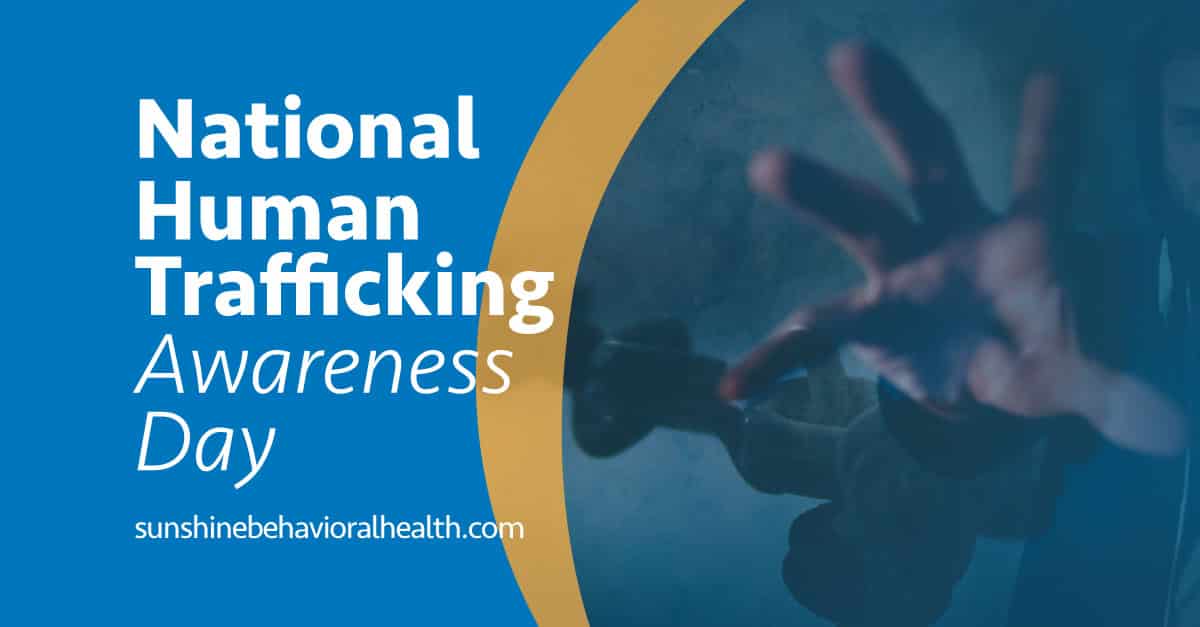
Raising Awareness About Human Trafficking
Since 2007, January 11 has been designated National Human Trafficking Awareness Day in the United States, and every January since 2010 has been National Human Trafficking Prevention Month.
Although it was only codified in U.S. law by the Victims of Trafficking and Violence Protection Act of 2000, human trafficking is not a new problem. It’s a form of slavery.
According to the U.S. Department of Homeland Security, human trafficking is the use of force, fraud, coercion, or other lures to obtain some type of labor, such as commercial sex acts or farm work.
The targets for human traffickers include vulnerable populations, such as people with substance use disorders and other mental health problems.
Despite the adoption of the 13th Amendment to the U.S. Constitution in 1865, slavery hasn’t completely disappeared in the United States. Depending on which source you believe, anywhere from thousands to hundreds of thousands of individuals are trafficked in the country.
Something that often accompanies human trafficking is substance abuse. According to the U.S. Drug Enforcement Administration, 25% of human trafficking survivors have an opioid use disorder or addiction. That’s because:
- Human traffickers target substance abusers. They attract them by supplying them with drugs.
- Human traffickers use drugs to control their forced labor. Drugs make them work longer and harder, without complaint.
- Those being trafficked might use drugs to cope with their situations.
In 2019, California had the highest number of reported cases of human trafficking in the United States, with 1,507 cases, and the seventh-highest rate (3.8 per 100,000 population). Texas comes in second (1,080) and 10th (3.63), respectively.
That’s partly due to their high populations—California is the most populous U.S. state, and Texas is second—high immigrant populations, and high need for cheap labor in industries such as agriculture.
But almost three-fourths (1,118) of California’s human trafficking cases involved the sex trade (such as massage parlors). An even higher number—1,290 or 85%—were women and girls. Globally, it’s 99% female.
Human traffickers manipulate vulnerable people with threats of physical, psychological, and emotional harm.
If they are addicted to alcohol or drugs—whether before the trafficking, as a result of the trafficking process, or to cope with being trafficked—they may fear losing access to the substance. In addition to legal help, they may require treatment for substance use disorder.
In addition to being female and having a substance use disorder, other factors that can make people vulnerable to human trafficking include:
- They’re underage, and fear being returned to a violent and abusive home situation.
- They’re guilty of some crime, so they fear arrest.
- They’re in the country illegally, so they fear deportation.
- They’re in debt to their captors and fear physical abuse or death.
- They’re part of a marginalized population (LGBTQ, intellectually disabled).
Resources for Human Trafficking Witnesses or Survivors
To end or reduce human trafficking, when you see something, say something by contacting:
- U.S. Department of Homeland Security at 866-347-2423
- National Human Trafficking Hotline:
- Call 888-373-7888
- Text HELP or INFO to BeFree (233733).
- Los Angeles Coalition to Abolish Slavery and Trafficking (CAST) Hotline at 888- 539-2373
- Los Angeles Metro Task Force – Human Trafficking Unit at 800-655-4095
- Los Angeles Crime Stoppers:
- Call 800-222-TIPS (8477)
- Text TIPLA plus your tip to CRIMES (274637)
- Visit lacrimestoppers.org
- Los Angeles FBI field office at 310-996-6565
- Local emergency services at 911
Sources
justice.gov – January 11, 2021 is National Day of Human Trafficking Awareness
2009-2017.state.gov – Victims of Trafficking and Violence Protection Act of 2000
dea.gov – Violent drug organizations use human trafficking to expand profits
worldpopulationreview.com – Human Trafficking Statistics by State 2021
sunshinebehavioralhealth.com – California’s Rehab and Addiction Resource & Information Guide
usatoday.com – 13 sex trafficking statistics that explain the enormity of the global sex trade
sunshinebehavioralhealth.com – Chapters Capistrano Luxury Treatment: Orange County’s Top Luxury Addiction Rehab
dhs.gov – Blue Campaign: Identify a Victim
humantraffickinghotline.org – The National Human Trafficking Hotline
A Message From Our CEO
Medical disclaimer:
Sunshine Behavioral Health strives to help people who are facing substance abuse, addiction, mental health disorders, or a combination of these conditions. It does this by providing compassionate care and evidence-based content that addresses health, treatment, and recovery.
Licensed medical professionals review material we publish on our site. The material is not a substitute for qualified medical diagnoses, treatment, or advice. It should not be used to replace the suggestions of your personal physician or other health care professionals.





